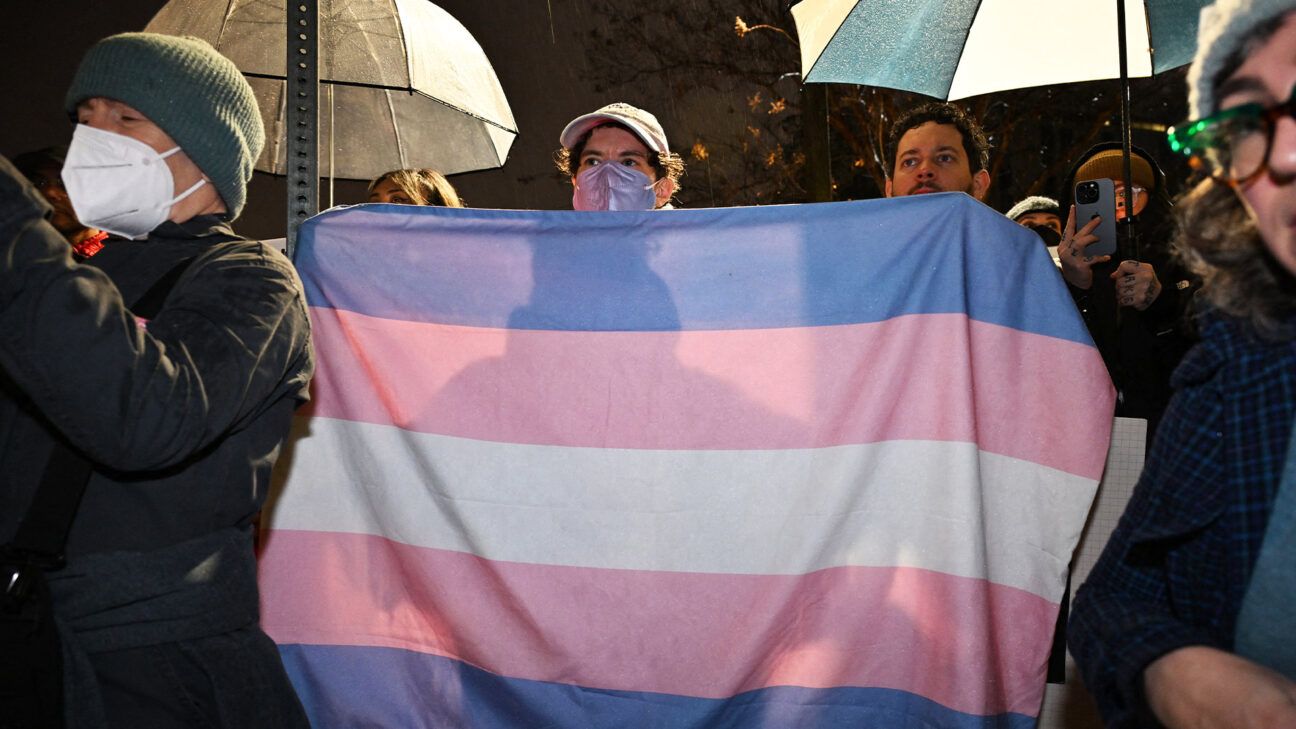Federal Judges Block Executive Orders Targeting Trans People: What To Know

Laws that target the mental and physical health of transgender Americans may cause significant harm. ROBYN BECK/AFP via Getty Images
- Federal judges have struck down two of three recent executive orders issued by President Trump targeting the transgender community.
- Health agencies have restored deleted webpages containing DEI language, and gender affirming care for trans minors is expected to resume.
- An executive order barring trans girls and women from playing sports is still under litigation.
- While executive orders do not immediately become law, more work still needs to be done at the state level to ensure the identities of transgender people are affirmed.
During his first few weeks in office, President Donald Trump signed multiple executive orders aimed at those who are transgender and gender diverse.
These orders sought to ban transgender girls and women from sports, remove funding for gender affirming care for transgender youth, and scrub language promoting diversity, equity, and inclusion (DEI) from health agency websites.
The executive order on “gender ideology” declared that the United States would recognize only two biological sexes, defying scientific consensus surrounding gender and reversing human rights gains over the past few decades.
However, an executive order is not automatically law. Some are tied up in U.S. courts, with judges ruling in favor of plaintiffs challenging the administration’s actions.
On February 11, a federal judge ordered health agencies like the National Institutes of Health (NIH), Centers for Disease Control and Prevention (CDC), and the Food and Drug Administration (FDA) to restore deleted webpages containing DEI language after Doctors for America filed a lawsuit.
On February 13, another federal judge blocked Trump’s order to restrict gender affirming care for trans youth. Before this ruling, some medical professionals reduced or eliminated gender affirming care, while others, such as those practicing in the state of New York, were instructed to maintain care.
Litigation on the executive order barring trans girls and women from sports is underway.
Jordan Held, LCSW, president and founder of Relentless Pursuit Therapy and Consulting and a board member of the Los Angeles LGBT Center, said that he and his colleagues saw a significant uptick in trans people of all ages in urgent need of mental health support after the executive orders were signed.
“Whatever the substance of the executive order, when your identity is named as a problem, it’s impactful,” Held told Healthline.
“And so what is happening, which is by design, is that these executive orders that are targeting certain communities are making people really validly think that they are in danger. You’re talking about a community that already has a heightened safety risk and rate of suicide and murder,” he said.
Mental and physical health effects of anti-trans laws
Laws that target the mental and physical health of transgender Americans may cause significant harm.
According to research conducted by the Trevor Project, suicide attempt rates among transgender and nonbinary youth rose 72% from 2018 to 2022, an increase attributed to a rise of anti-trans legislation targeting the community.
A 2023 study shows transgender people are already around 11% to 20% more likely to experience suicidal ideation compared with their cisgender counterparts.
Transgender people are more likely to misuse substances.
A 2021 study found that transgender people were more likely to use substances like drugs and alcohol than their cisgender peers.
Beck Gee, AMFT, owner of BGC Bridge Consulting, trains clinicians to provide affirming care and works in substance use and mental health treatment spaces.
Gee told Healthline the pressure of “feeling erased” causes significant mental health harm among trans folks, often leading to addiction and substance misuse.
“It directly impacts people’s physical, mental well-being where [someone might think] ‘I don’t want to get out of bed, I increase my drinking and drug use, or I relapse, I try to disassociate in so many different ways, mainly really negative ways, that impact my ability to get up for work in the morning, or show up for my life, or show up for the people that love me, or just show up for myself,’” Gee explained.
Beyond the data, there are also harrowing stories.
On January 27, a transgender veteran took their own life on top of a hospital parking garage in Syracuse. Draped in the trans flag, they left a note published later by a writer on Substack.
February 8, meanwhile, marked the 1-year anniversary of the death of Nex Benedict, a trans teen who was killed after being assaulted in the bathroom at their Oklahoma high school in 2024.
Because of the potential negative effects of denying a trans person their identity, some medical professionals, scientists, and researchers, such as those affiliated with the journal The Lancet, have recently reaffirmed their commitment to the use of inclusive language.
Federal agencies, meanwhile, have been ordered to restore deleted public-facing webpages and data containing DEI language so that medical professionals can access this important information for research and treatment.
Trans people, athletes need physical activity, too
A particular target of anti-trans policies challenging gender diversity is transgender youth, particularly those participating in sports.
Historically, policies like these have sought to remove trans women from competition.
During the summer 2024 Paris Olympics, for example, the South African runner Caster Semenya and the Algerian boxer Imane Khelif navigated trans-exclusive policies and faced potential disqualification.
Some have argued the testosterone levels naturally present in transgender girls and women are equivalent to those present in doping.
Trans women athletes continue to face hurdles despite research published by at least one anti-doping watchdog showing that transgender women who have undergone testosterone suppression have no biological advantages over their cisgender colleagues in elite sports.
On February 6, the National Collegiate Athletic Association (NCAA) released a statement noting they would change their policies to align with the executive order issued by the White House barring trans girls and women from sports.
At a Senate hearing in December, an NCAA representative noted that fewer than 10 athletes identify as transgender. The Department of Education is also pushing for collegiate and high school sports to remove the records, titles, and achievements of transgender athletes who previously competed.
Held, who competed in the NCAA as a rower before his transition, said that one of the main health effects of removing trans and gender diverse people from sports is that young people need physical movement.
“What’s happening for trans people and trans youth in particular [is] they’re afraid to play. Out of 500,000 NCAA athletes, there’s approximately 10 to 15 trans athletes we’re talking about. When it comes to [transgender]youth who play competitive sports, it’s an astronomically low number,” Held said.
Denying trans athletes the opportunity to play, let alone compete, is damaging to both physical and mental health, Held noted.
“We’re just blocking kids from play. And so from a pure human standpoint, this saddens me because we already, as a country, are dealing with an epidemic of young people using cellphones and social media and video games, and not engaging with peers. And this is further perpetuating this idea that kids do not deserve to play.”
Acceptance of trans identities begins at the state level
Jami Taylor, PhD, a professor at the University of Toledo and a co-author of “The Remarkable Rise of Transgender Rights,” said that while the public’s perceptions toward trans people have shifted, real change can happen at the state level.
“We have nondiscrimination policies in more than 20 states that are still going to be in existence,” Taylor said in response to the recent executive orders.
“The reach of them may be trimmed back a little bit with federal action, but those policies will still be on the books in a lot of states in the Northeast and on the West Coast and some of the Great Lakes states and assorted other states in the country,” Taylor told Healthline.
“And those policies will still be there, regardless of what goes on in Washington, because we have a federal system.”
Taylor noted that the status of state-level policies and laws are particularly relevant when it comes to healthcare for transgender youth.
“Currently there’s a lot going on in the health space for transgender youth. We see multiple states having policies that restrict such access,” Taylor explained.
“The Trump administration is trying to roll out these types of changes nationally by using the executive orders, threatening [to] cut off funds to service providers and those sorts of things. We’ll see some of these policies challenged in court. We’ll see what happens with that. Some things the federal government can do, but again, federalism is going to put some limits on what the federal government can do,” Taylor continued.
Gee added that one thing he is urging those affected by these policies to do is to find community, especially from older trans individuals and allies who have gone through decades of challenges to fundamental rights.
“This is not something that is brand new. It feels new for a lot of young people because a lot of young people don’t know a lot of history. And so they’re learning,” Gee said.
“When we start to learn these things and go, ‘Oh, there are people who have been in maybe not the exact same position but a very similar position before, what did they do?’ And seeking that help out too, is important.”
Takeaway
Federal judges have struck recent anti-trans executive orders issued by the White House. Health agencies like the NIH, CDC, and FDA have restored deleted webpages containing DEI language, and gender affirming care for trans minors will resume.
Meanwhile, an executive order barring trans girls and women from playing sports is still under litigation.
While executive orders do not immediately become law, more work is still needed to affirm and accept transgender identities.


